 |
|
 |
| |
Ads by Google, based on your browsing history
|
|
2020
March
30
|
Some encouraging news
The number of new COVID-19 cases per day in the United States has almost leveled off
(although it did wiggle upward just a bit today).
In Georgia and Kentucky (the states where all my descendants live), it's really coming down.
[NOTE ADDED:] All of these graphs showed an upturn on the following day
(March 31), but this is reportedly due to a sudden improvement in reporting procedures.
It will take a few more days to see what is really happening.
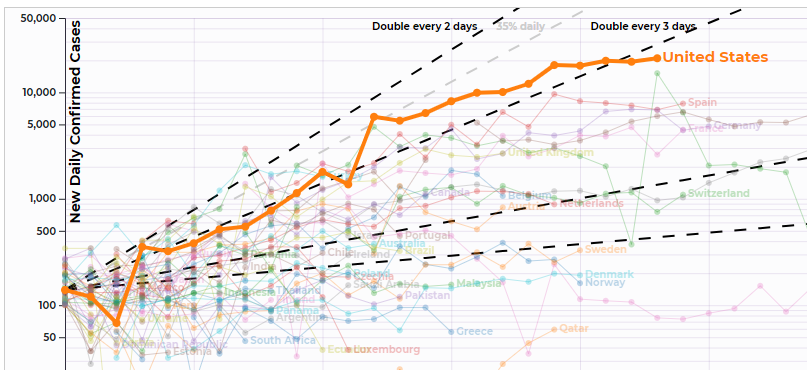
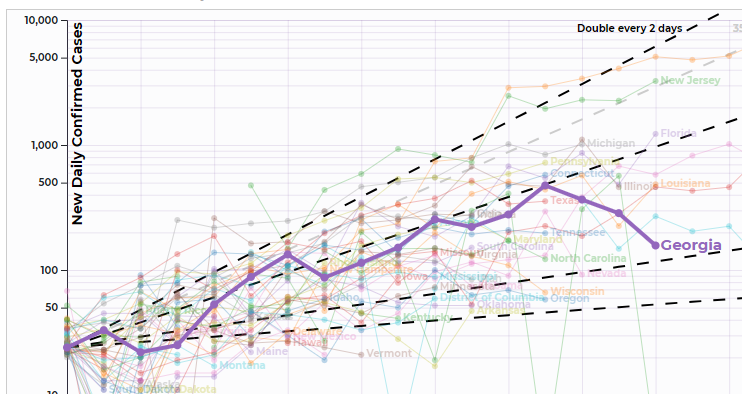
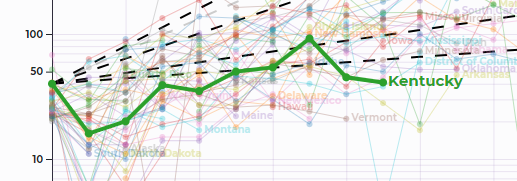
These graphs all end on the same day (yesterday). They are different widths
because each starts on the day some threshold was reached in its region.
They are from 91-divoc.com,
Creative Commons licensed. That site aggregates the Johns Hopkins COVID-19 data in
many useful ways.
Bear in mind that these graphs tell you how the disease was spreading two or three
weeks ago (allowing time for incubation and for getting test results, which can take a week).
That's when most places were first starting to take precautions. In the next few days we
should see the effect of the "lockdowns" that started around March 20.
Those graphs have a logarithmic scale, and they plot only new cases, not the total.
How does this compare to the familiar graph of cumulative cases rising exponentially?
Take a look:
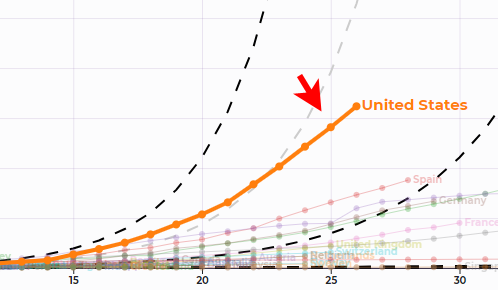
On this graph, what we see is that the exponential growth is straightening out —
becoming a straight line — no longer exponential. If the trend continues, it
will start to bend down.
Bear in mind also that the death rate isn't falling yet. It's not time for it to.
People don't die until a couple of weeks after they've been diagnosed. We can start
looking for
a fall in the death rate in mid-April.
Please note that this is not time to loosen any precautions!
This is the time to press on to victory.
Permanent link to this entry


|
2020
March
29
|
Short notes
In what follows, I'm going to catch up and write several Daily Notebook articles
that I've been planning for weeks. Hang on to your hats...
Speaking of hanging onto hats, my hat will fit better now that Melody has given me a
haircut. She cut my hair for about the first 30 years of our marriage, then retired
from that job as she started having trouble with her hips. But she hasn't lost
her talent.
It's a Sunday morning, and we will attend
Alps Road Presbyterian Church via YouTube
this afternoon. (Many people are viewing the service at the normal time of day, but it
was pre-recorded and it doesn't much matter what time we view it.)
And I just got an Amazon delivery. Amazon Prime is very handy for miscellaneous shopping.
We continue to survive at home, making brief, targeted expeditions for specific things,
most of which are medical. Yesterday I had to get a garden sprinkler (for newly planted
plants) and managed a very brief visit to Lowe's; while we were out, Melody and I also
drove around and looked at Athens under lockdown. Without getting out of the car,
I showed her FormFree's former site on Milledge Avenue where I spent so much time last month,
the temporary site that FormFree is moving into tomorrow (though I may never see the
inside of it!), and the new building under
construction.
"Why aren't you staying at home absolutely all the time, with the doors locked?" Because to
kill off the virus, we don't have to reduce everyone's contacts to zero. Reducing to 1/100 of
the former amount is good enough. A quick trip to get important supplies, with use of hand
sanitizer before and afterward, is nothing like a whole day spent on a crowded campus,
or even one trip to a restaurant.
Some people are just now realizing the epidemic is real, and I'm seeing some foggy thinking,
as if one person's extreme quarantine could make
up for other people's large gatherings. That's not how it works. One large gathering can undo
a hundred people's self-isolation no matter how strict. The reason is, you can't add a negative
number to the total. If someone else's exposure is 1000, it doesn't matter whether mine is 0 or
1 or 2 — either way the total is still very close to 1000. (I can't make mine be -500 or -1000
to counteract that; we can't get negative numbers.) Let's work on the big gatherings
and frequent contacts, rather than more heavily restricting people who are already restricted.
Let me add that you can't prevent exposures that have already occurred.
The growing death rate today reflects what the disease was doing three or four weeks ago,
when our government was still downplaying and denying the epidemic, and most of us weren't
taking more than slight precautions. Meanwhile, the new case rate is highly problematic,
because it very much reflects the amount of testing being done, which is variable and growing.
The best data-aggregation site I've found so far is
https://91-divoc.com,
which uses Johns Hopkins data and updates around 9 p.m. EDT every evening, seven days a week.
Finally, if you're still panicking, remember that most cases of COVID-19 are not serious,
and half do not even have any symptoms. This is certainly a serious disease, and it can
create horrible shortages of medical care, but it's not going to kill everyone.
Permanent link to this entry
Economics 101
This is something I said on Facebook, but it's important enough to say to everybody.
As you form your opinions about the economic stimulus package, it's important to be economically literate.
Traditionally, well-educated people have not been taught a bit of economics.
As a result, many of us try to analyze situations by guesswork or with a mental model
that is 200 years out of date. Or — worse — by pure imagination
— by making up something that fits a political ideology, and not checking whether it squares with known facts.
Economics is a science, and there have been genuine advances in it in recent decades.
I am not an economist. I am someone who had to scramble in later life to learn about economics.
So many of my day-to-day decisions involve economics — from voting to household management —
and I'm glad I did the scrambling. For anyone else who wants to scramble, I recommend the textbooks of
N.
Gregory Mankiw, who is politically conservative but very fair to all sides in controversies.
Economics is not just imagination.
You can't just make it up or deduce it all from everyday common knowledge.
Some things about economics are controversial or speculative, but others are established facts —
even facts you would not have guessed. You have to pay attention to what's really going on,
including knowledge that often takes great effort to collect. That's why economists pay so much
attention to statistics.
The bottom line is, the question is not "Does this sound plausible to me?" but "Do the facts support it?"
Facts are obstinate things.
One key fact to consider is that the coronavirus pandemic has already cost our economy and our government money.
It can't be prevented by ignoring it. The question now is how to redirect its effects to do the least harm.
Another key fact is that every recession costs the government money.
If the government just ignores the recession, tax revenues go down precipitiously.
If the government responds by cutting spending ("tightening its belt"),
economic activity goes down too, and the situation gets worse.
But if the government deliberately spends borrowed money, it can prop up economic activity and,
besides humanitarian benefits, recoup its missing tax revenue sooner.
John Maynard Keynes is famous for having and promoting this insight.
Will this deficit spending cause "hyperinflation"?
No. It does risk causing some inflation, reduced by the fact that it's happening in a recession.
But some people are throwing around the word "hyperinflation" as if we were going to have
inflation rates in the many thousands of percent (that's what hyperinflation means).
No. The stimulus package will add at most $6 trillion to our present $15 trillion money supply.
(I'm not totally sure about the $6T; I've heard lower numbers too.)
A bit of back-of-the-envelope calculation shows that if that were totally inflationary,
it would cause 40% inflation (once, not every month or every year).
But, precisely because we're facing a deep recession, it won't cause nearly that much inflation.
We're filling in a hole, not piling stuff up on the surface.
Many experts believe that deficit spending should happen in wartime and deep recessions,
to rescue the country.
The problem is that we have been deficit-spending like gangbusters in a time of peace and prosperity.
Why we have not had a higher inflation rate puzzles even the top experts.
I'm well aware that some of my readers know a good bit more about economics than I do,
and I will be glad to hear from them.
What we must beware of is people who don't know what they're talking about, but are talking very loudly.
Often, they are people who have made up a theory and not checked it against facts.
Permanent link to this entry
The EOS Ra, Canon's promising new astrocamera

For the third time, Canon has introduced an astronomy-modified version of one of its
best digital cameras. The
first one was the EOS 20Da, which I used extensively,
and the second was the EOS 60Da, which I own and have used for years.
Now comes the EOS Ra.
It got a rave review in Sky and Telescope
(preview here;
full review was published in the magazine;
see also the reviewer's blog entry).
Why haven't I written about it yet?
Largely because I hadn't used or tested one. Now, thanks to Stephen Rahn, I have some good test
data and sample results.
Bottom line: This is a good camera. But it is different. Simple sensor measurements do not give
a good comparison between this and the APS-C-format DSLRs I've been using until now.
Key characteristics of the EOS Ra are:
- Mirrorless.
- Has its own line of lenses and also takes EOS DSLR lenses and other lenses via adapters.
- Full-frame (24×36-mm) sensor that also operates in APS-C crop mode.
- Extended H-alpha sensitivity from the factory; no need for third-party modifications;
no worries about dust under the filter.
- Good color rendition in daytime photography, similar to Ektachrome film.
Perhaps not ideal for portraiture, but excellent for nature photography.
- Low-noise third-generation sensor.
- For astronomers, 30× magnification in Live View for precise focusing.
- Fold-out screen (important behind a telescope; not provided on the competing Nikon D810a).
Now about that sensor... It's hard to compare directly against the Canon 60Da or Nikon D5500
(the two cameras I'm using for deep-sky work now) because:
- The pixels are bigger: 5.34 µm on the Ra versus 4.29 µm on the 60Da and 3.89 µm on the D5500.
- That means the pixel surface areas are respectively 28.5, 18.4, and 15.1 square microns.
- The full-well capacity is about 64K photoelectrons, versus 34K and 24K respectively.
- Unlike the Nikon, the two Canons do not perform cosmetic preprocessing of the raw image.
While the Nikon doesn't "eat stars," it does deliver an image that is not truly raw.
The big pixels and higher full-well capacity mean that the gain (DN/e-) of the Ra is appreciably
lower than the others, and that's OK, because there are more electrons in every pixel.
That, in turn, throws off a lot of the other numbers you might be wanting to compare.
The read noise of the Ra is low, but in electrons it is higher because the whole process
uses more electrons, ultimately because each pixel captures almost 3 times as much light.
It does mean we have to re-think some optimizations. On the Nikon, unity gain (which guarantees
you're counting every electron — roughly speaking) occurs at the same ISO setting as maximum
dynamic range, namely ISO 200 or a tad higher. On the EOS Ra it doesn't. That means there is no
single best ISO for the Ra; use 200 if you want dynamic range, 800 if you are dealing with underexposure.
Looking at extremely stretched dark frames, I saw no vertical or horizontal banding;
the "tartan of the clan of Canon" is gone.
(Others,
however, do report banding.)
I did see a trace of amp glow and a few hot pixels.
Actually, this is good because it shows that the camera is delivering a genuinely raw image
and has not tried to cover anything up. I did not see perceptible amp glow or hot pixels in
uncalibrated deep-sky images; they are at a much lower level than any reasonably exposed photograph.
Being mirrorless, this camera has a body thin enough to work with any SLR lens.
Canon's adapter for EOS lenses automatically switches the camera to APS-C crop mode if you're
using an EF-S (smaller format) lens. So every EOS DSLR lens ever made will work.
Indeed, that's another Canon-versus-Nikon advantage: Canon cameras and accessories always
interoperate unless there's an obvious reason not to; Nikons are fully functional only with
lenses that are contemporary with the camera body, and there's constant change.
Will I be buying one? Maybe. The price ($2500) is a lot higher than an H-alpha modified
low-end DSLR (Nikon D5500 or Canon 200D for instance). But the quality is higher too.
On the other hand, at that price point it competes with cooled astrocameras.
Permanent link to this entry
Nikon improves its 18-55-mm kit lens

Here's another piece of old news. A few months ago, Nikon quietly but substantially improved
the 18-55-mm zoom lens that is bundled with APS-C DSLRs.
The biggest change is pulse-motor autofocus (AF-P).
That's important if you shoot video.
With the in-camera microphone, the new lens is just audible when it focuses;
with a microphone in the flash shoe, it can't be heard at all.
Contrast that with the "whirr, whirr" of the older lens.
The new lens is also an improved design. Here's a comparison:
|
|
AF-S Nikkor |
AF-P Nikkor |
|
18-55mm 1:3.5-5.6 G II VR |
18-55mm 1:3.5-5.6 G VR |
|
|
|
| Elements: |
7 (1 asph., 1 ED) |
12 (2 asph.) |
| Closest macro: |
0.31× |
0.38× |
| Smallest f-ratio: |
f/22 |
f/22-38 |
| Filter size: |
52 mm |
55 mm |
As well as quieter focusing, they've given us quite a step up in optical
quality.
I'm sure both lenses are optically very good; I'm ashamed to say I haven't used
mine for anything but making videos for the grandchildren.
I bought mine refurbished from Nikon at a bargain price.
Permanent link to this entry
Dietician or dietitian?
Recall that I was originally trained as a historical linguist.
Watch me put some of this training to use...
I've been told that the word for diet specialist is dietitian, and I've been
wondering why it ends in -itian, an ending that is otherwise rare.
Why not dietician? It turns out that spelling is used too, and there's quite
a war going on.
Being a linguist, I fully recognize that spellings are arbitrary; a language can spell a
word any way it wants to.
At the same time, as a user of the language,
when I have a choice of spellings, I prefer to (1) preserve
pronunciation (not an issue in this case); (2) follow existing patterns in the language;
and (3) be faithful to the origin of a word. That is, just like everybody else, I am wary
of random changes.
Now here's where it gets interesting. The spelling dietician is also well established.
Looking at actual usage on Google NGrams,
(here
and here),
we see that dietitian has been predominant since about 1890,
but dietician has been giving it healthy competition.
The -itian spelling appeared first, around 1808, but -ician outnumbered it for a while
in the 1800s.
Dietician preserves the pattern in physician, pediatrician, obstetrician, mathematician,
etc. (which are obviously
related, respectively, to physic(al), pediatric, obstetric, mathematic(al)).
I can't find another word ending in -itian, and there is no other word
starting with dietit-.
In fact, there's an etymology problem here. From Greek diaita + ik-, which
would go into Latin as diaetic-, we ought to have a word *dietic.
We don't. (Linguists mark a word with an asterisk when it doesn't exist.)
Instead, the word is dietetic.
So we have two historical questions: (1) Where did dietetic get the extra syllable?
(2) Who introduced the word dietitian, and why did they spell it that way?
It seems to be the older of the two spellings.
Over to the Oxford English Dictionary, which I can get on line through the UGA Libraries.
It turns out that dietetic goes all the way back to Greek.
Alongside diaita 'way of life, diet' the Greeks had another
word diaitētikē 'the art or science of diaita'.
From that, we get dietetic.
Maybe we should also have gotten *dietetician but we didn't.
From Greek we did, however, get dietist, which has dropped out of use.
Hmmm...
Now as for dietitian: The OED lists the word as dietitian, "also dietician."
That is, both spellings are in use, but the first one is dominant.
(The OED is not a prescriptive dictionary;
it doesn't tell you what to do; it tells you what people are doing.)
It defines dietitian as meaning the same thing as dietist.
And it gives no detailed history, certainly no account of who introduced the word,
but my own educated guess is that the T spelling is influenced by dietist
and maybe dietetic. I could snarkily describe it as a mistake that stuck!
So which one is correct?
The organized dieticians of the English-speaking world have some strong opinions.
I thank Tim Finin for pointing me to
this
brief account of attempts to make the T spelling official.
The trouble is, nobody can make a spelling official.
It will surprise some people that there is no official
authority for the English language — not even the Merriam-Webster Company,
even though its dictionaries often have a prescriptive tone.
The truth is, both spellings are in wide use, and the most you can do is make a large
organization adopt one or the other.
I am not at all sure why the T spelling is a point of pride among dieticians (dietitians).
Maybe someone taught them in early life that it is "correct" and they're sticking to it.
For myself, I see absolutely no reason not to use the C spelling, which has a better
etymology and preserves an existing pattern in the language.
Permanent link to this entry


|
2020
March
28
|
More notes about life during the Coronavirus War
This evening (March 27), while taking my walk, I briefly chatted with neighbors who
were having a scattered visit — each family sitting in a group of chairs about
10 feet from another family. That's the new norm. After about ten of these I may manage
to learn my neighbors' names!
Many people are losing their patience with the lockdown right about now, but I'm settling in.
And I can't overstate the frenzied pace of work. All the projects I'm involved in are going
like gangbusters; there's more work than we can do; nothing is slowing down at all.
One other note. After many days of damp weather at normal temperatures,
we now are having a heat wave — it hit 88 F today.
We're about to find out whether warm weather kills coronavirus (COVID-19).
I'll bet it doesn't, but if it does, we'll be thankful.
Permanent link to this entry
What happened to our grocery stores?
Although toilet paper has started to reappear in a spotty way, many groceries and other
household supplies are obviously in short supply, and stores are still running out of items.
At first I blamed this on the few people who, at the beginning of the panic, decided they
needed survivalist-style 3-month stocks of everything. But that's not it. There just aren't that
many such people, and they would only have done their mass buying once.
Why are the shortages continuing?
I think my daughter Cathy nailed it: People are wanting to shop less often (maybe once a week
rather than every couple of days), and the supply system can't handle it!
Grocery stores nowadays sell merchandise cheaply (which is good for us) but are
constantly on the verge of running out.
That is by design.
Everything depends on "just-in-time inventory"
delivered as a trickle that exactly matches the outflow. Small variations in the outflow
produce persistent or recurring shortages. It will be weeks before American supermarkets
get used to the new normal.
(Speaking of short supplies, the entire country is now sold out of webcams.
My co-workers are not going to get to see the growth of my hair during our weeks
without barber shops, and that's just as well!)
Permanent link to this entry
Star clusters in Puppis and Monoceros

This is the other astrophoto that I took on the evening of the 25th, dodging clouds.
This is a stack of six 1-minute exposures, Sigma 105/2.8 lens at f/3.2,
Nikon D5300 (H-alpha modified) at ISO 200 on my AVX mount.
Unlike the picture of Comet ATLAS below, this is not cropped and magnified;
you're looking at the whole field.
The star clusters at the lower right are M46 (left) and M47 (right).
Above M47 is NGC 2423.
The star at the upper right is Alpha Monocerotis.
Halfway from M47 to Alpha Monocerotis is a cluster with no NGC number;
it is known as Melotte 71.
The cluster at the upper left is NGC 2506, and at the mid left, NGC 2539.
Permanent link to this entry


|
2020
March
27
|
The wartime experience
Our situation during the coronavirus lockdown is very different from most
other people's. I was fully set up to work from home already, and Melody and
Sharon are accustomed to being at home a lot of the time.
So we don't find ourselves displaced and with time on our hands.
We feel for the people who do — at earlier stages of my life I might
have been quite frustrated by this kind of restriction.
Far from being idle, I'm very busy. All of my consulting work is very much in demand.
There is also an ongoing flurry of electronic communication — e-mail, social media,
and the telephone. Everyone who can still do business is trying hard to do a lot of it.
Oconee County (to the south of me, where we usually shop) now has an emergency order,
but it's much less explicit that Clarke County's. People are not supposed to leave
their houses unless "vital to the safety or health of their family" or something like that.
No discretion, and it sounds to me like they are going to have to walk back on this almost
immediately to avoid shutting down too many businesses. Except that very little is actually
forbidden; it's a guideline.
Permanent link to this entry
Comet C/2019 Y4 (ATLAS)

There is still astrophotography in wartime. On the evening of the 25th, the clouds parted
enough for me to get a couple of pictures.
The fuzzy little greenish object at upper right,
Comet C/2019 Y4 (ATLAS), may be a bright comet later in
the spring. It is one of several comets discovered by
the Asteroid Terrestrial-impact Last Alert System (ATLAS) project in Hawaii,
hence the name.
The prominent group of three stars are Rho, Sigma-1, and Sigma-2 Ursae Majoris, and
the galaxies M81 and M82 are outside the field on the left. They were in the
original picture, but due to passing clouds, I didn't get a good, even image.
This would have been a very interesting picture to take from a dark site under a
clear sky because the area is full of integrated flux nebulosity.
Nikon D5500 (H-alpha modified), Sigma 105/2.8 lens at f/3.2, AVX mount, stack of
four 1-minute exposures, cropped.
Permanent link to this entry


|
2020
March
25
|
Four-leaf clover

I have had the pleasure of presenting Melody with three four-leaf clovers in
two days. We have a patch of clover in our yard that produces a lot of them.
When I said this on Facebook, to my surprise I got a lot of replies from ladies
about what a romantic gesture this was, and how it proves I'm a good lover.
Hmmm... To them I can only say, I belong to Melody, not anyone else.
She gets all my four-leaf clovers.
Permanent link to this entry
Retro Doritos
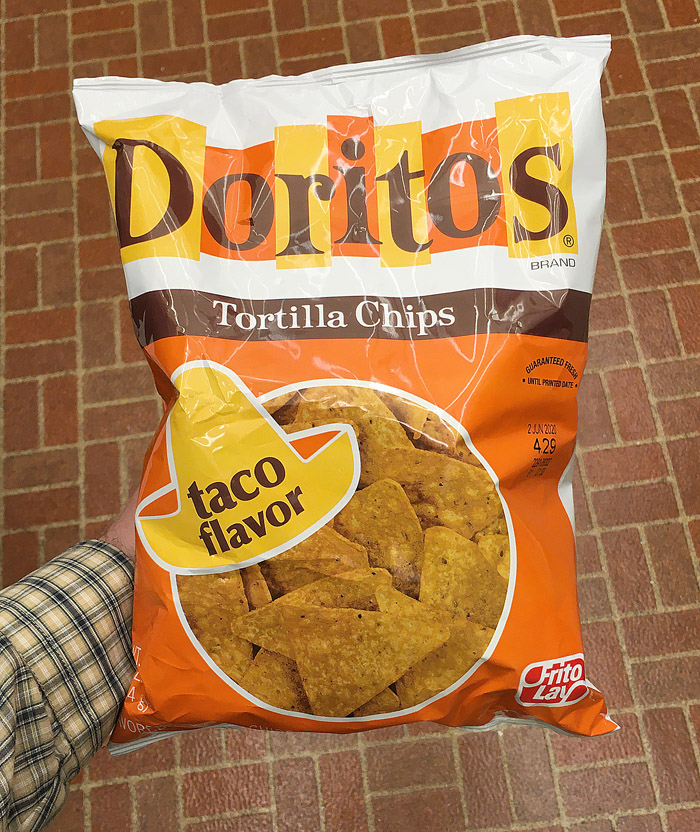
This is not our very first bag of Doritos in 1967
in the kitchen in Valdosta when I was a child.
It's what I got at Publix yesterday, in our kitchen in Athens,
despite the similar floor pattern.
Taco-flavor Doritos are again being made and sold in authentic 1960s packaging.
Sampling them, I find that they're delicious. This is my favorite flavor of
Doritos, and I hadn't had one in decades. In 1972 or 1973, nacho-flavor became
dominant and taco-flavor almost disappeared.
According to Wikipedia, the tortilla chips now universally served in Mexican restaurants
were invented in the early 1960s
in a restaurant at Disneyland and initially marketed as Doritos,
although many other brands and individual restaurants now make them.
They are not traditional Mexican cuisine.
Historical question: My recollection is that my father brought home our first bag
of Doritos, that they were taco-flavored, and that he described the flavor as "musty."
But he died in October 1966, and Wikipedia says taco-flavored Doritos were first
marketed in 1967. Maybe our first bag of Doritos was actually the original
unflavored kind. Melody suggests another possibility: that Valdosta was a test market
for a product not yet marketed nationally. That is quite possible; at the time,
Valdosta was the kind of place where locally targeted advertising could easily be done.
C&S Bank test-marketed its first ATM there.
Permanent link to this entry


|
2020
March
24
|
Electronic repair in wartime
We no longer have barber shops, and our old hair clipper is worn out, so we got out
another one, a rechargeable Remington that we got a few years ago.
Its charger had been lost.
So I took it into the workshop and, using a voltmeter and then a lab power supply,
determined its power requirements.
Then I looked through my junk box of old chargers for one I could adapt by putting a
plug onto it like the unusual one Remington used.
I found one that was electrically correct and already had the right plug on it.
It said "Remington."
Reunited at last...
Permanent link to this entry


|
2020
March
23
|
Why not just imprison everybody right now?
The bad idea I'm hearing in today's social media chit-chat is that we should just
quarantine everybody in their homes for two weeks right now, and then we'd be rid
of the virus.
There are some really good reasons not to do that.
First, it's not necessary. To stop the epidemic, all we have to do is get the spread rate
of the virus down well below 100%, so that a lot less than 100% of the cases lead to new cases.
Left to itself, it's about 250%, so each case leads to two or three more cases, and that's
why it spreads so explosively.
If we can reduce the spread rate to maybe 1/100 of what it is now — to 2.5% instead
of 250% — then the disease will quickly become rare.
It's probably not hard to reduce the average person's
contact with other people to 1/100 of what it was.
Stop joining big crowds. Go out only when you need to, and very purposefully.
It's not necessary to reduce it to zero, and it's not feasible.
Second, don't forget about necessary work.
If you get this total quarantine that you're asking for, will your electricity stay on?
Will your garbage get picked up? Will your Internet and TV work? Of course not.
You can't live without other people's services. Trying to stop everybody from working
would be catastrophic.
Not to mention the shortages from shutting down factories, and the crops lost from
shutting down farms, and the suffering and mess if farmers are forbidden to feed their
chickens. Think what you ask for.
Third — and this should be obvious — a lockdown today will not stop the
exposures that happened last week.
Now I do think we need official restrictions everywhere, not just in selected
places. I am aghast that although Clarke County has restrictions, DeKalb County
(eastern Atlanta) does not, right now. And many smaller counties are doing nothing at
all.
The danger is from people who still gather for block parties and the like,
not people who go to the pharmacy briefly once every three days.
By the way, I prefer the rule of law to the rule of guilt-trips. That is, I want restrictions
to be as explicit as possible (even if they are only guidelines, not compulsory).
When I go get Sharon's medicine or my own office supplies,
I want to be able to say that what I am doing is explicitly permissible, rather than
be judged by people who "feel" that my trip isn't "necessary."
End of rant. We will now have a non-coronavirus blog entry (below).
Permanent link to this entry
Veil Nebula

Our weather hasn't allowed me to do any astrophotography for weeks, but while
trying out software last night, I reprocessed a picture of the Veil Nebula
that I took back in June.
The new version may look a little better.
Sigma 105/2.8 lens at f/4, H-alpha-modified Nikon D5500, stack of four 4-minute exposures
at ISO 200, AVX mount without guiding corrections.
Permanent link to this entry


|
2020
March
21
|
War stories
Why liquor stores are open:
Though I have not actually seen this given as a reason, it's likely that one reason liquor stores
are being kept open under lockdowns is that alcohol withdrawal can kill.
We can't afford to tie up our ambulances and hospitals with alcoholics going into seizures and delirium.
Something like 2%-5% of our population is at risk.
That is very sad, but it makes sense.
At the same time, I'm afraid a lot of people, stuck at home, are going to start drinking way too much.
Business casualty:
Melody and I went to pick up a Kroger order yesterday (which went smoothly), and on the way there,
I went into OfficeMax (Alps Road shopping center) for a couple of items that they didn't have.
In fact, the OfficeMax store is being shut down.
There has been an office-supply store at that location for 25 or 30 years
(formerly Office America), so I'll miss it.
OfficeMax and Office Depot merged a few years ago, and I suppose this was just a
matter of time, but I wonder if the lockdown is a factor.
I also wonder how many other local businesses will shut down for the lockdown and
not come back.
In the 1970s, that area was the Miller's or Gibson's variety store.
Before my time, it was the Alps Drive-In Cinema (which gave its name to Alps Road),
and long before that, it was the airport!
Civilization starting to break down:
I am told that the following occurred in a city north of here this morning:
A Walgreen's Pharmacy was ready to open for the day, and an angry crowd had gathered
outside. One case of toilet paper was in stock. The employees decided that instead
of selling it, they would just chuck it outside and lock the door!
How the people divided it up, and how violent the process was, I do not know.
Permanent link to this entry


|
2020
March
20
|
Locked down
Athens is now under an official shelter-in-place order.
Text online here;
my archived copy here.
We're not allowed out of our residences (which I take to include my yard!) except for
specified reasons.
Fortunately, the list of specified reasons is long.
"Essential businesses" include grocery stores, hardware stores, gas stations, post offices and shipping centers,
and quite a few other things. We're allowed to go to essential businesses as customers, and also to go to work
if the employer is essential or if we're doing minimum basic operations such as running payroll, maintaining
the building, or supporting people who work from home.
Other legitimate purposes include exercise — I can still go for walks, and even drive to other places
to go for walks. But there are no social visits or gatherings of any size.
I think the county is going to have to clarify the ordinance today, because some things are unclear or missing.
The first few that come to mind:
- Are lawn care people in the same category as electricians and builders, allowed to
continue operating? (An immediate concern to me.)
- What happens to people who are moving from one residence to another (or businesses
that are moving offices, such as FormFree)? Can they do it? With what impediments?
- There seems to have been no awareness of churches as parts of the community.
Churches can do "minimum basic operations" but can they produce televised services?
What about traditional prayers, Masses, etc., conducted with only a few staff
members present, whether or not they are televised?
And one-on-one pastoral visits, which might be sorely needed in some
cases?
- What if someone dies? Mortuaries aren't listed as essential businesses! It needs to be legal
to conduct funerals and burials with immediate family present.
- And weddings? Courthouses are still open, but please allow people to solemnize their
weddings in church, with the minimum number of witnesses present, if they want to.
There's a good white paper
(well, web page) from ERLC about the ethics of
cancelling church services. Key point: Churches are not knuckling under to a government that
wants to wipe them out; they are recognizing their ethical obligation to stop the virus, and
cooperating with government-imposed plans for doing so.
Death to the coronavirus!
Update: The list of "essential businesses" has been broadened.
Official link
here;
my archived copy
here.
Churches can stay open with no restrictions, although televised or online services are strongly
encouraged. Mortuaries are allowed to stay open. So are lawn care services.
I am preserving these documents because in a few years, they will be curiosities of wartime.
The Athens lockdown is closely modeled on the one in effect for the State of California, and I think
we will soon be to the point — as Los Angeles already is — where the precautions are the
same whether or not an individual has the virus, and tests will only be performed if they affect treatment.
Permanent link to this entry
Helping the economy recover
[Previously posted on Facebook.]
I should say a little about what I've been busy with in my day job.
Unfortunately, it has to do with unannounced products and services, so I can't tell you!
But it does have to do with helping America survive and recover from the coronavirus epidemic —
not just our physical health, but also our economic health, for families as well as for businesses.
If the coronavirus epidemic puts you out of work (whether directly or indirectly),
your bank is eager to help.
Loan modifications, forbearance, and similar measures are in the works.
Back during the 2008 recession, lenders learned that it is much better to rehabilitate a mortgage
— give the borrower more time, change the terms, or whatever — than to lose it.
And that's where FormFree comes in. And that's all I can say about it!
One more thing. I hope I can hold this up as an example of why
people who care about making the world a better place should work in the financial sector.
Many of us are brought up to think of "business" as amoral money-grubbing. Not so.
Financial services can make people's lives better.
For more about this click here,
here, and
here.
Permanent link to this entry
What it's really like
We've effectively been sheltering in place for about a week, and the biggest surprise
is that I don't have a bit of spare time.
The reason? I still have a full work schedule; errands, though much less frequent,
need more planning; and a huge amount of time is spent simply receiving and processing
information about the epidemic and the measures to combat it.
For instance, I've put about an hour into analyzing Athens' new ordinance and trying to
figure out what practices I need to change, if any.
It's like living on a farm that is far enough out that I don't go to town every day,
but at the same time, I have plenty of work to do.
Permanent link to this entry


|
2020
March
19
|
A dispatch from the front lines
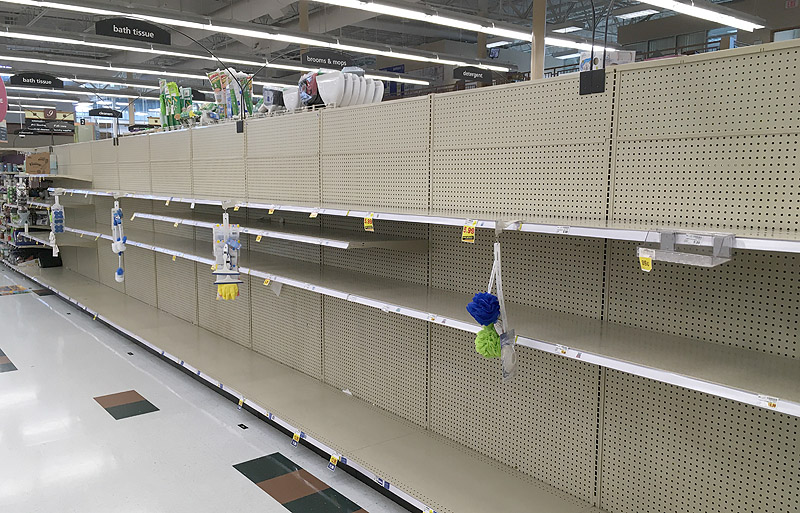
Yes, the toilet-paper famine is real, and I am still rather puzzled by it.
Here you see the "bath tissue" shelves at our local Kroger, and the scene is
the same nationwide, and in the UK, and in Australia.
I remain puzzled. Even if people decided to do their usual shopping early,
they shouldn't have emptied the grocery stores like that.
Kroger is also low on numerous canned foods.
My first theory is that this was due to hoarding, and to a considerable extent
it may be. (Remember the bozos who cleaned central Tennessee out
of 17,000 bottles of hand sanitizer, hoping to resell it at a profit.)
But I now think the other
thing it shows us is a fragile just-in-time supply system, particularly
at big, discount-priced chain stores, which have arranged to get only the
amount the normally sell, and it's very hard for them to get more.
There is, however, a sign of a break in the famine. Kroger did have one brand
of "bath tissue" (I've never called it that!), not on the shelves but in boxes
on the floor. More welcome, I'm sure, than the first robin of spring.

Permanent link to this entry


|
2020
March
18
|
"What was life like before the war, GranDad?"
Continuing my theme that this is like the outbreak of WWII...
I think life after the epidemic will not be the same.
There are going to be irreversible changes in how we do things.
First let me describe normal life as of a couple of weeks ago.
I've already been in a work-from-home or work-from-anywhere situation
for several years, and I often sat in the UGA Science Library with my
laptop, alternating work with reading books. (I started reading
my way through that
library in 1973 and haven't finished yet.) My last afternoon at the library
was Thursday, March 5, before spring break.
At other times I worked in the FormFree office on South Milledge Avenue
at Cloverhurst (which is planning to move imminently; I've probably
seen the old place for the last time). A common daily routine, though
not the only one, was to exercise at The Prescription Gym (a gym attached
to a physical therapy clinic), eat lunch at Firehouse Subs, run one
or more errands, and proceed to FormFree or the library to work.
On Wednesday evenings we often went to classes at Alps Road Presbyterian Church,
and of course we regularly attended Sunday services there.
About two thirds of our dinners were eaten at restaurants (La Parrilla,
Cracker Barrel, Chicken Salad Chick, and others) because Melody isn't
always up to cooking.
I should mention a couple of other exercise venues that I won't be
using for a while. Through last week, I often walked for exercise inside
Georgia Square Mall, which is never crowded. Now I don't consider that safe.
My other favorite place to take walks was the UGA campus; during the academic
year, I would often park in the Georgia Center deck, walk to the Tate Student
Center and back, and then return to my car, get my briefcase, and go into
the library. I could still do that, and it would be safe because of the lack
of people, and the library is even open, but it wouldn't be the same.
That's a slice of pre-war life. I record the details here because they're
probably never again going to be the same.
Now let's look at how our country is changing.
In the years after WWII, the automobile became part of our lives in a way that
it hadn't been. It became normal to work and shop at places you could only
reach by car. The layout of our cities changed.
I think that's happening again, but it's not the automobile, it's the Internet.
Telecommuting has been gaining ground for ten years (the way cars did in the 1930s),
but now it's becoming normative.
Businesses in the future may not have office space where everyone can gather.
There's a precedent for this: a century ago, the telephone made it possible for
industrial companies to have their executive offices downtown, far away from the
factories.
Telecommuting can have a profound effect on human geography and real estate.
If you don't have to go to the office, why not live in Podunk? That is, live in a
quiet country town where the cost of living is lower. Again, there's a precedent:
trains (around New York), and then automobiles, led to the rise of suburbia,
enabling people to commute thirty miles to work in a big city. Telecommuting
allows you commute a thousand miles if you want.
The other thing that will be part of our lives is home delivery.
Amazon is, of course, a powerhouse. Our household, which is typical,
probably gets five Amazon packages a week, and we've not even tried to shift
all our shopping there (yet). A more recent development is that
Kroger and Publix now deliver groceries. Several agencies
deliver take-out food from restaurants. If all of these keep working, I can
stay in the house almost indefinitely.
What I think I'm going to miss is face-to-face interaction with people.
The Internet is no substitute.
This is going to be particularly hard on shy people who don't have
much of an intentional social life,
but rely on seeing others at places where they are naturally brought together,
such as church, school, or work. I like being in places where I don't have to demand
people's attention, or entertain them, but simply let them give me as much attention
as they want, and no more. That's the good thing about big gatherings, the kind of
gatherings we can no longer have.
Permanent link to this entry


|
2020
March
17
|
Life in a time of pestilence
So how did we spend the day? At home, of course. I did a teleconference
with FormFree from my upstairs office at 11 a.m., then programmed, off and on,
all afternoon, taking breaks to walk around the yard and, in one case, the neighborhood.
Fortunately, the weather was mild, and I enjoyed seeing some neighbors.
We did not need to run any errands today.
But in answer to a question that keeps coming up,
businesses that don't draw crowds of strangers are not being shut
down, and should not be.
If all Americans were confined to their houses, we would soon starve from
lack of food and other necessities.
We want people to keep working.
Many kinds of work can be adapted to minimize close contact with other people.
But we cannot simply stop the nation in its tracks and shut everything down.
To put it bluntly, that would cause more deaths than the coronavirus.
Permanent link to this entry
Facebook infrastructure failure
This afternoon, one of my Facebook postings was taken down as "spam"
"violating community standards" and "manipulating likes."
I replied that I disagreed with the decision, but they did not say anything
about reviewing it. Even so, within an hour my posting was visible again.
To see a copy of it,
click here.
You'll see that there's nothing controversial or offensive.
I've heard scattered reports that other postings were taken down with
the same kind of mysterious allegations around the same time.
I'm thinking this is a failure of Facebook's spam-detection algorithm.
Given its very random nature, I wonder if the problem was scrambled
database keys, so that after detecting a real spam posting, they went to
another random posting to take action.
[Update:] There is now a considerable amount of news coverage about this.
It's a widespread problem.
Permanent link to this entry
Overfitting
In machine learning, overfitting is what happens when your mathematical model
is so closely fitted to the data on which you based it that it will not generalize
to any other data.
In evolutionary biology, something similar happens when an organism is so well
adapted to one particular environment that it can't survive a change.
And I think we're seeing the same thing in business practices that are too "efficient"
for their own good — have no reserve capacity or adaptability — such as
"just-in-time delivery."
That was part of the cause of the Toilet Paper Famine of 2020, which is starting to ease.
Stores had tuned their supply system to work so efficiently — that is, with so
little margin for changing conditions — that when challenged, it broke down
dramatically.
Maybe the lesson from this will be that maximum efficiency is risky.
You're safer with a safety margin.
Permanent link to this entry


|
2020
March
16
|
Like the beginning of World War II
It's not December 7, 1941, but it's close.
The COVID-19 coronavirus epidemic has caused more disruption of American life
than anything else in my long lifetime.
We are strongly cautioned by all levels of government to avoid unnecessary
trips out of the house, and especially to avoid meetings, gatherings, restaurants,
and bars.
Businesses that don't draw crowds of people
are not shutting down, and apart from some stupid panic-buying,
there's no lack of necessities.
But we're supposed to "shelter in place" as much as possible —
for two to six weeks!
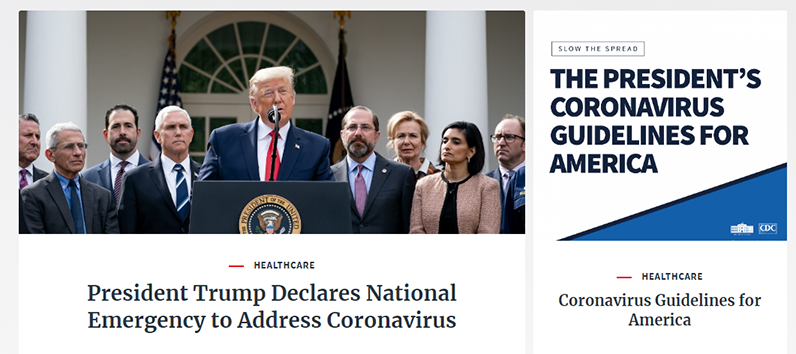
The problem is:
-
In the United States, there are over 3,000 confirmed cases of COVID-19,
and that number is doubling every 3 or 4 days.
At that rate, if nothing slowed it down, it would infect 50% of the population within two months.
Technical note: We aren't sure how much of this is spread of
the disease vs. spread of testing, which was initially scarce and caused
cases to be missed. But we can't bet our lives on an optimistic interpretation.
-
If we don't slow it down, the infection will overwhelm our hospitals, and we
will have the tragic situation Italy has had, where dying people have to be
turned away because there are no rooms or respirators for them.
Even if we don't cut the total number of infections, let's at least
not have them all at the same time.
-
The only way to slow down the virus is to keep people from coming together
and spreading it.
-
Apparently, the bulk of the spreading is occurring among gregarious young people
who have minimal symptoms and don't know they're spreading it.
That is why schools are closing for a month; most universities are closing
(or switching to online learning as best they can) for the rest of the semester;
and in many places, bars and restaurants are being shut down.
Here in Athens, steps are being taken to quash the town's bar scene and party culture.
Even though the students are on spring break, St. Patrick's Day is coming up, and
people are wanting to congregate on the streets and in the downtown bars.
This evening the county commission almost passed a curfew.
Instead they've passed a ban on gatherings of more than 10 people,
including gatherings in bars and restaurants and on the street.
Bottom line? If we do enough, it may look as if we did too much.
But if we do too little, it will be terrible.
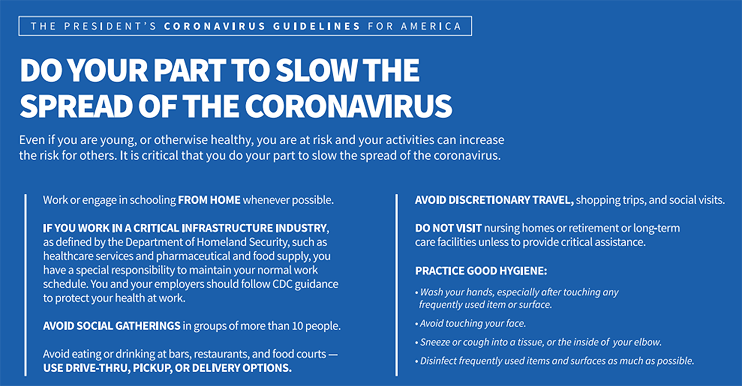
Permanent link to this entry
High-school experiences ruined?
Students at all levels of education are in a fix.
It will be hard to figure out how to make them whole — give them the
education they were entitled to, without wasting their time or money any
more than absolutely necessary.
High-school seniors are particularly hard-hit. High school only happens once,
and unlike college, you can't just tack on another semester if things haven't
unfolded as they should. Graduation, the senior prom, the pre-season football game —
for the class of 2020, these aren't going to happen.
I have two suggestions. First, let's talk up the idea of
celebrating the class of 2020 during the week after Christmas,
when all colleges are on vacation.
High-school graduates will be in their home towns and can gather for
ceremonies and festivities then.
Second, to the young people I have something important to say.
Think of this as like the outbreak of a war.
Normal life is disrupted, but you have new duties and new opportunities.
Can you help people with errand running, child care,
public information, education for younger people,
or other things that keep civilization going?
These are not normal times. Neither was the Class of 1942.
Think about how, in ten years, you want to be able to tell people how you
helped get America through the coronavirus epidemic.
That is much more important than having a perfectly elegant traditional senior year.
Permanent link to this entry
Political consequences of the epidemic
I am seeing a heartening swing away from rugged individualism toward community spirit.
People are realizing that we need to take care of our fellow citizens, not just build
our own wealth.
I expect this to manifest itself as a strong leftward shift on many matters of public
policy. In a real disaster — which this is — it becomes evident that
we all benefit from helping those in need.
It's not a matter of people who "pull their weight" subsidizing freeloaders.
Rather, employers, communities, and society as a whole needs to share the risk
so that unforeseeable misfortunes do not ruin individuals.
No, I haven't switched to socialism, or anything like that.
But I think it is vitally important for all of us to pull together.
Permanent link to this entry
And it hits close to home
Coronavirus precautions have already made it harder to get medical care, and this
has affected my sister, who needs eye surgery (for a retina problem) and may not get
it at all — certainly not promptly — and delay means the outcome will
be worse.
Permanent link to this entry


|
2020
March
15
|
A journal of the plague year, continued
The mood I'm seeing on Facebook has changed from denial to panic. Nobody can grasp
that we face a finite enemy to which we need a measured response.
The key need right now is to cut down the peak — that is, slow the spread
of the virus so that, even if a lot of people eventually get it, they don't all need
to be in the hospital at the same time, overloading the facilities.
The toilet-paper hysteria seems to be related to a widely circulated, but poorly thought-out,
recommendation to have 3 months of household necessities in stock in case of a pandemic.
Poorly thought out for two reasons: Pandemics don't shut down all businesses, and stores
don't have three months' supply in stock for people to buy all at once.
Even a severe national lockdown would leave us with grocery stores open and delivery
services still available (and quite a lot of businesses operating normally).
There has also been hoarding and profiteering. The New York Times reports two brothers
in Tennessee who went from store to store, buying up all the hand sanitizer, planning to
re-sell 17,000 bottles of it
on Amazon and eBay at highly inflated prices. Such people should not be welcome
in polite society.
The main need right now is to avoid crowded places, including large meetings,
public transportation, and maybe bars and restaurants, and avoid personal contact
(handshakes, hugs, etc.) with people you don't already see every day. I'm happily working at home.
Permanent link to this entry


|
2020
March
14
|
The toilet-paper apocalypse
A remarkable number of events are being cancelled, and schools closed, to slow
the spread of COVID-19. Many schools are on spring break now and will continue to be
for two or three extra weeks. Churches are cancelling services tomorrow (March 15).
We are not actually forbidden to get out; businesses are not closing; but,
as a nation, we're going
to avoid crowds.
What is surprising is the shopping apocalypse.
Partly to prepare for having children at home longer, but mostly, I think,
because of mass hysteria, everybody in the country has decided to go to the grocery store
and buy lots of everything, especially toilet paper.
Why people want extra toilet paper is beyond me. Somehow, the toilet-paper panic
rolled (pardon the pun) on and on beyond all reason. In some towns, none is available
in stores. I saw someone carrying the last package of Charmin out of our local Target
store this afternoon as I went in to buy some other things.
As best I can determine, some kind of general list of disaster-preparation supplies
has been circulated by word of mouth and whittled down to just toilet paper (and maybe
bottled water, which there's also a run on). I've heard from one person who thought
the stores were all going to close in a couple of days, leaving us to live on (and clean
ourselves with) whatever we could manage to buy this weekend.
[Revised.] And I think some people have sunk into hoarding,
buying more supplies than they need simply because they can.
Please, civilized people, work on
helping your country survive, not just yourself.
Think about whether you are depriving your neighbor.
Key fact: The factories and stores aren't shutting down. Even in partial quarantine,
you'll still be able to get necessities. The strict quarantines in Asia and Europe have
taken this into account.
Meanwhile, everyone seems to imagine the apocalypse is upon us, and the only defense against
the zombies is toilet paper.
One last note. We don't have a stockpile, but Melody and I did have a decent supply of
toilet paper before the panic started. We went on Facebook and offered a modest amount of it
to any neighbor who completely runs out and can't get any.
See also Jeff Duntemann's blog entry.
Permanent link to this entry
The Warren bankruptcy plan
I am not going to endorse a political candidate this year, but I do want to point out that
Elizabeth Warren's bankruptcy-reform plan
(see this article
and this position paper) has been
incorporated into Biden's platform (as well as Sanders'). So it's going to be
part of the Democratic position this year.
This is important because,
whether or not you agree with her politics,
Elizabeth Warren is the expert on bankruptcy.
It has been her area of scholarly study at Harvard Law School for decades.
She has written books.
Now, you may disagree entirely with her recommendations.
But note that you're dealing with an expert.
That means that if you want to advocate something different,
there's a lot of homework for you to do.
She has the details.
Her values are left of center, and conservatives will need to craft their own
approach, based, if possible, on just as much expertise.
This is not trivial.
As we go into the election, both parties need to have well-thought-out positions.
I don't have a considered opinion on the whole thing.
But I do understand the purpose of bankruptcy.
It is not to let people shirk responsibility;
it is to rescue people from impossible situations,
to keep people productive rather than ruining them,
to share assets fairly between creditors when there is more than one,
and to make lenders take their fair share of the risk.
Crucially, many bankruptcies are caused by unforeseeable calamities,
often medical problems, and society's goal should be to rescue rather
than punish people to whom such things happen.
I do not know enough about her plan to make student loans dischargeable.
I think they should be dischargeable in bankruptcy provided we avoid
the nightmare scenario — new graduates, with hardly any assets, declaring bankruptcy
right after graduation, when they have nothing to lose but their student loan debt.
This is entangled with the fact that the loans are 100% federally guaranteed
and should have been only 90% guaranteed, so that the lender would care about
the risk. I think a lot of people have been pushed into taking student loans
without any realistic information about the consequences, and the whole system
has gone awry.
As for massive student loan relief, it would indeed be good for the economy,
and education is a worthy thing to spend public funds on, but
a retroactive freebie wouldn't
be fair to people who chose not to take student loans
(maybe setting for inferior colleges) or people who borrowed through other
mechanisms. Maybe a retroactive scholarship, a grant to people who were educated
regardless of how they paid for it, would be fairer.
Permanent link to this entry


|
2020
March
12
|
A journal of the plague year
I'm not referring to Defoe's memoir, but my own. The world is in a panic
(and there have been tragic deaths) because of coronavirus COVID-19.
Georgia is not hard hit, although there have been (so far) about thrity
confirmed cases and one death.
I am taking normal cold-and-flu precautions (hand-washing, avoiding unnecessary trips to
crowded places, and some of what is now called "social distancing") and working from
home a lot (though not exclusively). The University has extended Spring Break two more
weeks in order to assess the situation. Some schools are closed, but closing grade schools
is a questionable move (not being done in Britain, for instance) because the disease
does not hit children very hard and because they are not necessarily safer with their
parents. After all, a school with a few hundred students exposes people to the same
germ pool every day; it's not like a university of thirty thousand, nor an airport.
Our government's response, halting as it is, is open to criticism. Measures are directed
almost entirely at propping up the financial sector, not helping individuals.
And there have been odd moves such as cutting payroll taxes — which is no help to
people who are not getting paychecks.
It has long been axiomatic, on the right wing, that what's good for business is good for people;
now is the time to appreciate the other side, that what's good for people is good for business.
Our economy is being stress-tested, and one thing people are realizing is just how fragile
some things have been. The "gig economy" of multiple part-time and contract jobs is no substitute
for what most workers had in the 1960s —
an employer that (even for totally selfish reasons) cared about its workforce.
This is partly inside information, but I am glad to report that the banking industry is
hastening to help people with such things as emergency loans and forbearance on debts.
And FormFree is in it on the right side. We need to get back to understanding that the
economy consists of people, not just corporations.
Permanent link to this entry
Short news notes
A major reconstruction of our front yard and underground drainage system has just taken
place, done by Joseph Nkefor, d.b.a. Senior Partners Landscaping, highly recommended.
(Listed in this business directory.)
Someone put out the word that COVID-19 would cause a shortage of toilet paper (how?),
and people have been emptying the store shelves.
I think they've mistaken a virus for a hurricane. But why aren't they buying food?
Do they have a use for toilet paper that we don't know about?
Here is one of the worst foreign-language puns I have ever perpetrated: "Les français sont francophones;
les anglais sont anglophones et saxophones."
(Sorry; it doesn't make sense in any language but French.)
Permanent link to this entry


|
2020
March
11
|
The last normal day
[Written February 15, 2022.]
I've come along two years later to write this Notebook entry because the date deserves
one.
Wednesday, March 11, 2020, was America's last normal day.
In the preceding few days, many of us had heard that there was a coronavirus
outbreak coming, and we had resolved to wash our hands more, and take other
precautions, just as we might during a flu outbreak.
But we were leading normal lives.
At the time, like most of FormFree, I was working mostly remotely from home
(or from the UGA library, but not this day, since it was spring break).
A co-worker
suggested that it would be a good day for several of us to come to the office, and I did;
it was then in rented space on South Milledge Avenue.
As it turned out, that was the last time we gathered in that office.
That day, the World Health Organization declared a pandemic;
that evening, a pro basketball game was cancelled;
and by the next day, many public gatherings were shut down.
That's the day the war started.
[Added 2022 March 11:]
From digital records I can reconstruct more of my "last normal day."
Slack (the office messaging system) shows that
I got the invitation from the co-worker around 10:30 a.m. and replied
that I was going to do a teleconference from home at 11 before coming in.
My invoice shows that it lasted slightly more than half an hour.
Then I may have had lunch at home but more likely went to
Firehouse Subs.
Facebook tells me I checked in at The Prescription Gym at 1:10 p.m.
My routine in those days was to do e-mail and work from home, then go to lunch
and the gym, and then work at the UGA Science Library, home, or
occasionally FormFree, whose office at the time wouldn't accommodate
all of us all the time.
Not only was it my last day in the old office, but also my last
visit to the sub shop and the gym.
Further note: I must have eaten lunch at home that day; my financial records
show a transaction at Firehouse Subs on March 9 but not afterward.
Isn't it remarkable what detective work I can do?
Permanent link to this entry


|
2020
March
10
|
The Disney Kodachromes
During my last year of graduate school, I went to a showing of some newly rediscovered
early animated cartoons by Walt Disney under the title "The Disney Kodachromes."
I thought this set would continue to be known by that name, but I never heard it again.
So yesterday I did some digging and found the following in The New York Times,
October 25, 1981:
It turns out they were not filmed on Kodachrome, but merely duplicated on Kodachrome, apparently
for distribution.
(In 1981 or in the 1930s? Surely Disney duplicated them before sending them to Yale,
unless the vaults already contained multiple copies.) These cartoons
are included in the Silly Symphonies anthology that has been
released on DVD.
One that I particularly remember is
Lullaby Land, a baby's dream about playing with
forbidden things such as safety pins and fountain pens.
I like pre-WWII animated cartoons because of their elaborateness.
In those days (before Hanna-Barberism set in), the goal was to show what animators could do,
not merely provide minimal images to carry the story along.
And although popular with children, they also entertained adults.
Permanent link to this entry


|
2020
March
8
|
Finding buried cables in the yard
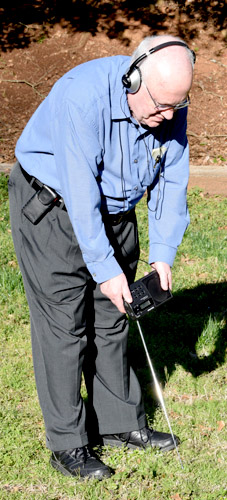 We're having some landscaping done, and we called 811 to get the utilities to locate
the buried power and Internet cables, but they didn't locate the wires that carry power to
our outdoor lampposts. So I figured out how to do that myself.
We're having some landscaping done, and we called 811 to get the utilities to locate
the buried power and Internet cables, but they didn't locate the wires that carry power to
our outdoor lampposts. So I figured out how to do that myself.
I wore headphones and used a small shortwave radio, tuned to a frequency that didn't have much on it
(in my case 3.200 MHz; lower frequencies are better than higher ones).
I already knew where part of the wiring was, and I quickly determined that the radio
picked up strong noise when the antenna was near the cable and the power to the lampposts
was on; the noise was much weaker when the power was turned off.
That's how I knew I was listening to the right thing.
Then it was a simple matter to follow the wire from the house to the lampposts.
I used a shortwave radio because it is sensitive to out-of-band noise
and receives through its extendable antenna.
A radio tuned to the AM broadcast band would be using its internal loop antenna
rather than the external one, and an FM radio would not pick up much out-of-band noise.
But if you want to try this, use any radio you have; it might work.
Along the way, I also found it easy to trace the Internet cable and an abandoned AT&T telephone
cable (which is probably still connected to the line, just not activated at the exchange).
Each had its own kind of noise.
I don't know how reliable this technique is, and I wouldn't bet my life that there is no
cable somewhere just because it doesn't find one.
But if you know what you're looking for, it can be handy.
Permanent link to this entry
Tracking down an awful smell in the workshop

Here you see the culprit, imprisoned. The story of its capture was long and adventurous.
Last fall, I noticed a strong smell in my workshop and attributed it to the flux in the
new lead-free solder I had started using. This led to the purchase of a fume extractor
(not a lot better than the one I had already made for myself) and a concerted effort to
clean up everything that might have flux residue on it.
The smell was so annoying that it was hard to localize.
After cleaning or moving anything, I had to wait a couple of hours or more to see if
the smell had changed.
Eventually I did some rearranging and the smell moved — away from the solder,
away from the soldering iron.
It was what chemists would call an amino smell, a complex compound with nitrogen in it,
like maybe epoxy hardener...
Hmmm...! Or as Sherlock Holmes would say in the early editions, Halloa!
I sniffed around and traced it to this bottle of J-B ClearWeld Hardener.
Why the smell comes from that bottle, I don't know, because I can't see any leaks.
But the hardener definitely contains amino compounds. And something called
"poly alkoxylated hydroxyalkyl thiol," and although I'm not much of a chemist,
I know that "thio-" means sulfur, and sulfur, in an organic compound, usually
means smell. (MSDS
here,
and note that it is the second data sheet in the file.)
The epoxy resin, in the other bottle, does not have much of an odor.
It took three weeks for the residual smell to clear up after I put the bottle of hardener
in a jar. But clear up it did, and soon the room smelled quite clean.
Today I had occasion to mix up some epoxy. So I opened the jar and was instantly
reassured that that is where the smell comes from! I closed it again as soon
as I could.
Permanent link to this entry
TJ(max)
Today I had a funny thought about how a certain
department store got its name.
In semiconductor data sheets since the 1960s, the maximum junction temperature, TJ ,
has occasionally been called TJ (max),
pronounced exactly like the name of the store.
Make of this what you will.
All I know is that two unrelated things will now remind me of each other for
the rest of my life.
Permanent link to this entry


|
2020
March
7
|
Total solar eclipse of March 7, 1970
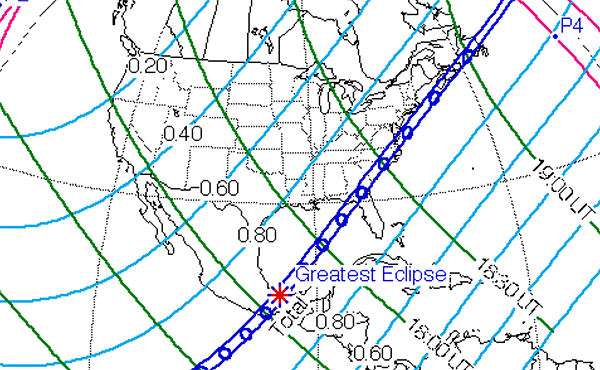
Today is the 50th anniversary of the eclipse
that piqued my (and many other people's) interest in astronomy.
Unfortunately I cannot currently lay hands on my color slides from that day;
they are packed up in one of several places that are not accessible just at
the moment. When they surface, I'll scan them and put them on the Web.
In the meantime I give you part of a NASA map.
The good news was that the track of totality went straight through my
home town, Valdosta, Georgia, and the front lawn of West Hall at Valdosta State
College was designated the ALPO's prime site. It drew astronomers amateur and
professional from all over the country, as well as CBS TV crews.
I was there, and a wide-angle picture
of the site, in Sky and Telescope (May, 1970, if I remember right),
shows me at the left edge, wearing glasses and a jacket.
The Wikipedia
article about this eclipse
has links to the CBS TV coverage from Valdosta.
The bad news is that we were totally clouded out. Although the sky was clear
the previous night, it was solid overcast on the day of the eclipse.
I did manage to make one observation of possible interest.
The texture of the clouds changed after totality, and I took pictures.
They were smooth stratus clouds before totality and lumpy afterward.
I don't know what that means, but I've learned since then that the
zone of totality is noticeably cooler than the surrounding air, and it
is common for cumulus clouds to go away at totality as they do at sunset.
I also saw one dramatic sight. Even seen through clouds, the purplish-red
shadow of the moon swept in from the southwest at incredible speed, and a couple
of minutes later, fled just as swiftly to the northeast.
Now that it's 2020, 50th anniversaries of important events in my youth will be
coming along regularly. We're just five and a half years from the 50th anniversary
of my meeting Melody. But the other thing going on this year is that my new job
is keeping me busy. FormFree is growing
almost faster than you can imagine a business growing; it must be at that crucial
step where it finds its market, and its market finds it! I don't plan to slow down,
but I will be posting fewer Daily Notebook entries.
Permanent link to this entry


|
|
|
This is a private web page,
not hosted or sponsored by the University of Georgia.
Copyright 2020 Michael A. Covington.
Caching by search engines is permitted.
To go to the latest entry every day, bookmark
http://www.covingtoninnovations.com/michael/blog/Default.asp
and if you get the previous month, tell your browser to refresh.
Portrait at top of page by Sharon Covington.
This web site has never collected personal information
and is not affected by GDPR.
Google Ads may use cookies to manage the rotation of ads,
but those cookies are not made available to Covington Innovations.
No personal information is collected or stored by Covington Innovations, and never has been.
This web site is based and served entirely in the United States.
In compliance with U.S. FTC guidelines,
I am glad to point out that unless explicitly
indicated, I do not receive substantial payments, free merchandise, or other remuneration
for reviewing or mentioning products on this web site.
Any remuneration valued at more than about $10 will always be mentioned here,
and in any case my writing about products and dealers is always truthful.
Reviewed
products are usually things I purchased for my own use, or occasionally items
lent to me briefly by manufacturers and described as such.
I am no longer an Amazon Associate, and links to Amazon
no longer pay me a commission for purchases,
even if they still have my code in them.
|
|



















 We're having some landscaping done, and we called 811 to get the utilities to locate
the buried power and Internet cables, but they didn't locate the wires that carry power to
our outdoor lampposts. So I figured out how to do that myself.
We're having some landscaping done, and we called 811 to get the utilities to locate
the buried power and Internet cables, but they didn't locate the wires that carry power to
our outdoor lampposts. So I figured out how to do that myself.

